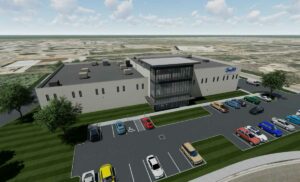The Southwest Research Institute (SwRI) has officially broken ground on a new, cutting-edge facility dedicated to advancing high-speed propulsion technologies in the public and private sectors. Dubbed the Center for Accelerating Materials and Processes (CAMP), the planned two-story, 36,000-square-foot facility is expected to cost the organization $34 million to construct.
Once completed, CAMP will offer researchers at the prestigious institution state-of-the-art tools and techniques needed to advance the technology and manufacturing process of advanced high-speed propulsion systems for aerospace applications. This not only includes evaluating existing propulsion technologies for both military and civilian uses but also finding methods to reduce production times and costs associated with at-scale manufacturing of these advanced systems.
“This new facility will see the development of innovative technology that reflects SwRI’s mission of serving humankind,” said Dr. Ben Thacker, vice president of SwRI’s Mechanical Engineering Division, in a company statement. “Advancing high-speed propulsion systems propels us toward a future with stronger defense capabilities and greater global connectivity.”


High-Speed Propulsion Technologies in Increasing Demand
In the 1960’s a joint venture between Britain and France resulted in the world’s first commercial supersonic aircraft: the Concorde. Unfortunately, following the aircraft’s first fatal accident in 2000, that technological marvel was ultimately retired in 2003 due to advancing costs and aging technology.
Since then, world travelers have been limited to subsonic speeds, resulting in longer flight times, particularly in overseas travel. More recently, a number of companies have begun to push the envelope of high-speed transportation technologies, with the goal of not only recapturing commercial supersonic travel but also creating aircraft that can travel at hypersonic speeds, meaning over five times the speed of sound.
At the same time, the U.S. Department of Defense (DoD) has been steadily increasing its development of hypersonic technologies for advanced defense applications. For example, the U.S. Air Force has continued to advance the development of its 183A hypersonic missile with relative success. The U.S. Army has tested its own “Dark Eagle” hypersonic missile program, and the U.S. Navy has invested in the development of a morphing hypersonic engine that can allow aircraft to travel near the edge of space.
Now, the folks at SwRI say their new CAMP facility will allow researchers working on these types of advanced technologies and more to collaborate on methods and materials designed to rapidly deliver high-speed propulsion technologies to the market more efficiently and at lower costs than ever before.
“Market forces, including growth in global defense, air travel, delivery, and transportation needs, are driving the demand for high-speed engines,” the company explained. “Initial projects in the new CAMP facility will focus on demonstrating faster, more efficient techniques for manufacturing high-speed propulsion systems.”
Project Funded by the Defense Department
Once the facility is completed, the team says they will begin evaluating different materials and processes used in the construction of high-speed propulsion systems. According to SwRI, the goal of this effort is “to produce a high-speed engine in a considerably shorter amount of time than current production timelines.”
Although many of the details provided by SwRI focus on the potential commercial market for high-speed propulsion technologies, the project is funded by the Office of the Secretary of Defense’s Manufacturing Science and Technology Program. This likely means that research at this facility will not only advance high-speed travel in the commercial sector but also aid the Defense Department’s high-speed propulsion efforts.
“This project will help ensure the U.S. is a leader in high-speed propulsion research and development,” said Dr. Barron Bichon, director of SwRI’s Materials Engineering Department. “SwRI is committed to advancing this vital technology on behalf of Texas and the nation.”
Christopher Plain is a Science Fiction and Fantasy novelist and Head Science Writer at The Debrief. Follow and connect with him on X, learn about his books at plainfiction.com, or email him directly at christopher@thedebrief.org.

